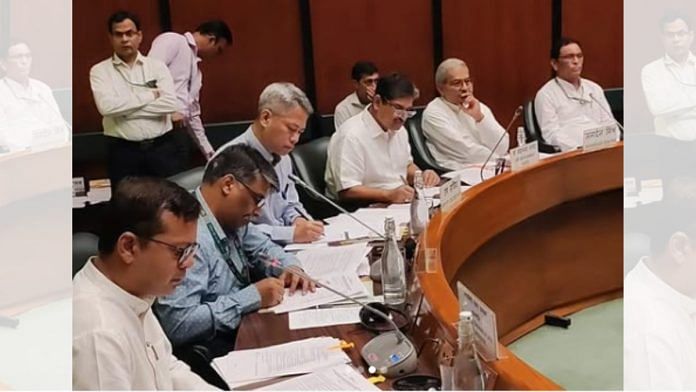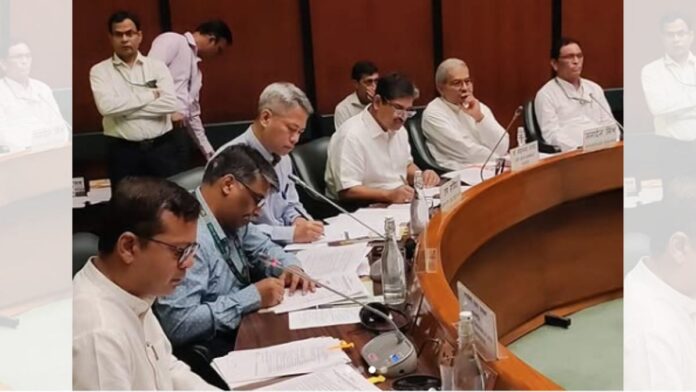


New Delhi: With a substantial amount of central grants to states for panchayati raj institutions unused, a parliamentary panel has found “critical lapses” in managing grants, using funds, financial reporting and record-keeping by states.
In its report on the demand for grants — submitted to the Union Ministry of Panchayati Raj — the Standing Committee on Rural Development and Panchayati Raj raised concerns about the diversion of funds to non-priority areas and a lack of transparency in the use of funds.
Based on the 15th Finance Commission (2021-26) recommendations, the panchayati raj institutions (PRIs) receive tied and untied grants from the central government via the state governments. These grants expire 31 March 2026.
The tied grants can be used by panchayati raj institutions for basic services, such as sanitation or the maintenance of the ‘Open Defecation Free’ status, the supply of drinking water, rainwater harvesting and water recycling. The untied grants meet location-specific needs — mentioned in a list of 29 subjects in the 11th schedule of the Constitution — including fisheries, rural housing, minor forest produce, and poverty alleviation, among others.
Headed by Congress MP Saptagiri Sankar Ulaka, the committee found that Uttar Pradesh, Madhya Pradesh, Maharashtra, Bihar, Gujarat, Rajasthan, and Tamil Nadu, among others, had substantial tied grants lying unused.
Uttar Pradesh, which has the highest number of panchayati raj institutions (59,889) in the country, had nearly 45 percent of the funds released as tied grants lying unspent as of 21 November 2024.
“Uttar Pradesh had an opening balance of Rs 3,607.82 crore, with an additional allocation of Rs 3,705.35 crore, resulting in total available funds of Rs 7,313.17 crore,” the ministry informed the parliamentary panel, highlighting the use of only Rs 4,030.53 crore, leaving Rs 3,282.65 crore, or nearly 45% of the fund, unspent.
Similarly, Maharashtra had Rs 5023.68 crore of Rs 7,276.28 crore lying unused.
Even for untied funds for location-specific requirements, several states, such as Maharashtra, Tamil Nadu, Rajasthan, Bihar, and Uttar Pradesh, among others, had between Rs 1,900 crore and Rs 3643 crore lying unspent in each of their coffers.
“Non-utilisation of allocated funds exacerbates these issues, hindering timely local development projects. States with weaker, faulty planning systems face non-implementation and low fund absorption, reflected in high unspent balances,” the committee said.
The analysis of the disbursal and the use of the untied grants in 2023-24 mentioned in the report points out significant discrepancies in fund allocations, delay in disbursal of funds by the Centre, lack of transparency and accountability in fund utilisation and focus on non-priority areas.
“A significant portion of untied funds is being diverted to non-priority areas. Madhya Pradesh, for example, allocated a significant amount of untied funds to general administration costs,” the report said.
It also said the Union Ministry of Finance delayed the release of untied grants for key states, such as Bihar and Rajasthan, by several months.
“Rajasthan faced delays in receiving over Rs 1573.04 crore, affecting critical local governance 51 projects. Such delays have significantly hampered the state’s ability to execute development projects on time,” the report said.
The committee recommended the ministry streamline the process for timely funds disbursement and set up a strong monitoring mechanism.
Its suggestion: “A comprehensive policy framework by the Ministry of Finance and Ministry of Panchayati Raj, with performance-linked incentives and penalties to promote efficient fund utilisation wherein states — demonstrating effective utilisation should be rewarded — with additional grants or flexible terms in future allocations.”
Also Read: Rural-urban transition, reforms in Municipal Act. How Modi govt plans to improve city governance
The data provided by the ministry pointed to a lack of transparency in the use of funds. States, including Madhya Pradesh, Uttar Pradesh, Odisha, and Gujarat, had financial reporting and record-keeping issues.
“The critical lapses in grant management, non-utilisation of funds, financial reporting and record-keeping across various states, such as Gujarat (10,127 cases), Madhya Pradesh (4,215 cases), and Uttar Pradesh (4,995 cases) and Odisha (3097 cases), show alarmingly high instances of non-utilisation of grants, highlighting inefficiencies in fund deployment,” the report said.
The committee observed that the diversion of tied and untied grants remains a concern in particular in Chhattisgarh, Madhya Pradesh, and Telangana.
The committee observed that the number of audit observations regarding the diversion of funds by states indicated that “funds earmarked for essential services such as water and sanitation are being used for unintended purposes”.
“The committee raises concerns about the diversion of funds to non-priority areas, delay in disbursal of funds, lack of transparency, and inadequate planning that undermine the potential of untied grants to address local needs effectively,” it said.
The “non-production of records” by various states, such as Madhya Pradesh (41,281 cases), Uttar Pradesh (19,732 cases), and Telangana (12,129 cases), during audits “undermines transparency and complicates audits”, the committee further said.
The committee recommended the ministry take corrective measures to ensure the proper use of funds and enhance accountability.
(Edited by Madhurita Gowami)
Also Read: 3.42 lakh fraud cases detected under Ayushman Bharat-PMJAY. Over 56,000 unnecessary surgeries




